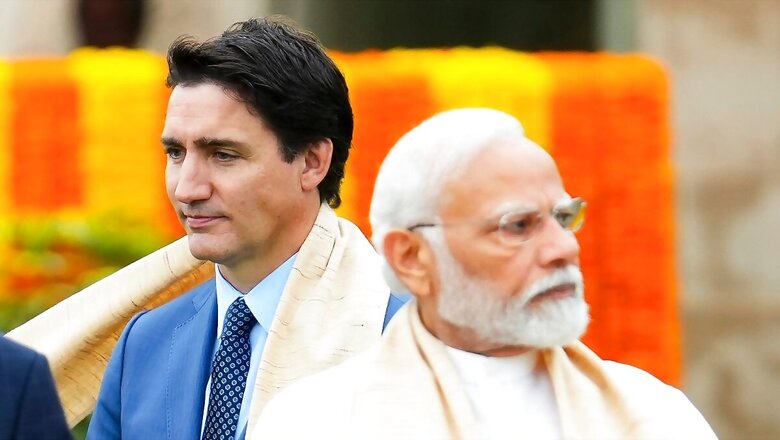
views
The Government of India has done the right thing to take strong, visible and calibrated action against Canada’s open hostility to our sovereignty and territorial integrity. In fact, given Canada’s openly provocative conduct, such a stern response was overdue. No country can allow another nation — even if friendly and democratic otherwise — to become a haven for terrorists and extremists working openly for its dismemberment. But this is precisely what Canada has been doing for decades now.
On October 14 this month, Canadian Prime Minister Justin Trudeau’s government named Sanjay Verma, India’s High Commissioner to Canada, as a ‘person of interest’ in the ongoing investigations in the murder of Canadian citizen Hardeep Singh Nijjar, a known Khalistani terrorist. Ottawa alleges that India, or its agents, were responsible for killing a Canadian citizen on Canadian soil. New Delhi had straight away rejected the allegation as rubbish. Canada had then said that it had ‘credible’ evidence for this accusation, but has so far not made this public, and India has stated on record that nothing of this sort has been provided to it.
The naming of India’s High Commissioner as a ‘person of interest’ in this murder is just short of declaring the envoy persona non grata. India’s reaction to this outrage is entirely correct. We have withdrawn our HC, and expelled six other Canadian diplomats, including the acting head of the High Commission. We have strongly refuted Canada’s accusations about our complicity in the Nijjar killing, and have conveyed with resoluteness that we are not prepared to take this kind of behaviour from a ‘friendly’ country lightly.
The essential point is: can a country with which we have diplomatic relations, institutionally support individuals and organisations whose avowed goal is to split India, and against whom there is a verifiable track record of terrorism directed against us? To my mind, the answer is a categorical ‘no’. Canada has long been undisputedly culpable on this account. In 1971, Dr Jagjit Singh Chouhan announced himself as the ’President of Khalistan’ while residing in Canada. Canada took no action against him. The biggest terrorist action prior to 9/11 was the bombing of Air India flight Kanishka from Montreal to New Delhi in 1985, where 328 people were killed. The terrorist organisation, Babbar Khalsa, operating out of Canada, publicly took credit for this act. The then Prime Minister, Pierre Trudeau, was credibly accused of sheltering the head of Babbar Khalsa, Talwinder Parmar. He refused India’s request to extradite him on the absurd ground that India was insufficiently deferential to former British Queen Elizabeth, who was the titular head of Canada.
His son, Justin Trudeau, has carried this pro-terrorist bias to a new level, more so because his political survival depends on it. His popularity ratings have touched a new low. The Canadian economy is seriously hurting under his precarious coalition government, in which, until recently, Khalistan supporter Jagmeet Singh’s New Democratic Party, was a member. Canada has, after India, the largest number of Sikhs in the world. They number around 800,000 and constitute 2.12 per cent of the total population. However, Sikh militant organisations fund Trudeau’s Liberal Party far above their numerical size. Their representation in Trudeau’s cabinet is also completely disproportionate to their electoral strength, grabbing four out of 30 cabinet posts, including that of the defence minister.
In closely contested elections, Trudeau needs Sikh support, and in availing this, is willing to abjectly pander to pro-Khalistan and terrorist sentiments. Bluntly put, he is catering to vote-bank minority politics, at the cost of another country’s sovereignty, with which it has diplomatic relations, and is also a co-signatory to all the UN conventions and resolutions adopted against terrorism. Nijjar, about whose death all this fracas is about, was known to the Canadians for his anti-India and terrorist links. He entered Canada on false grounds which was discovered but overlooked. He was the leader of the extremist Khalistan Tiger Force, worked closely with Gurpatwant Pannun, head of the banned Canadian chapter of ‘Sikhs for Justice’, and was in active contact with Pakistan’s ISI from which he also received funds. Further, India had given Canada evidence of Nijjar’s hand in targeted killings in India, our National Investigation Agency (NIA) had declared him a terrorist, and Interpol had issued a Red Corner Notice against him.
None of this is of any concern to Trudeau. His wild accusation against India was a cynical act of political self-protection, because he was well aware that within the extremist Canadian Sikh organisations, there was considerable internecine rivalry, and Nijjar could well have been a victim of it, especially since he was involved in a bitter dispute with another faction on the control of a gurdwara.
The next elections in Canada are in October 2025. The only hope of a possible resolution to the current situation is that Trudeau is booted out, and the next government takes a far more balanced and restrained view in its relations with India. Most Canadians are unhappy with the growth of the Khalistan terrorist monster in their own country. Many Sikhs themselves, and members of the larger Hindu community, also resent the way Indo-Canadian relations are being hijacked by a violent minority.
India must expose Western hypocrisy on the question of suppression of terrorism, and the conspicuous silence when openly secessionist movements are flagrantly encouraged in countries like Canada against India.
If Trudeau continues with his disastrous policies, India should ask for international sanctions against his government for supporting international terrorism. We should ask Canada’s friends what they would do if a friendly country was clearly complicit in using terror to break up their own country.
The author is a former diplomat, an author and a politician. Views expressed in the above piece are personal and solely those of the author. They do not necessarily reflect News18’s views.



















Comments
0 comment